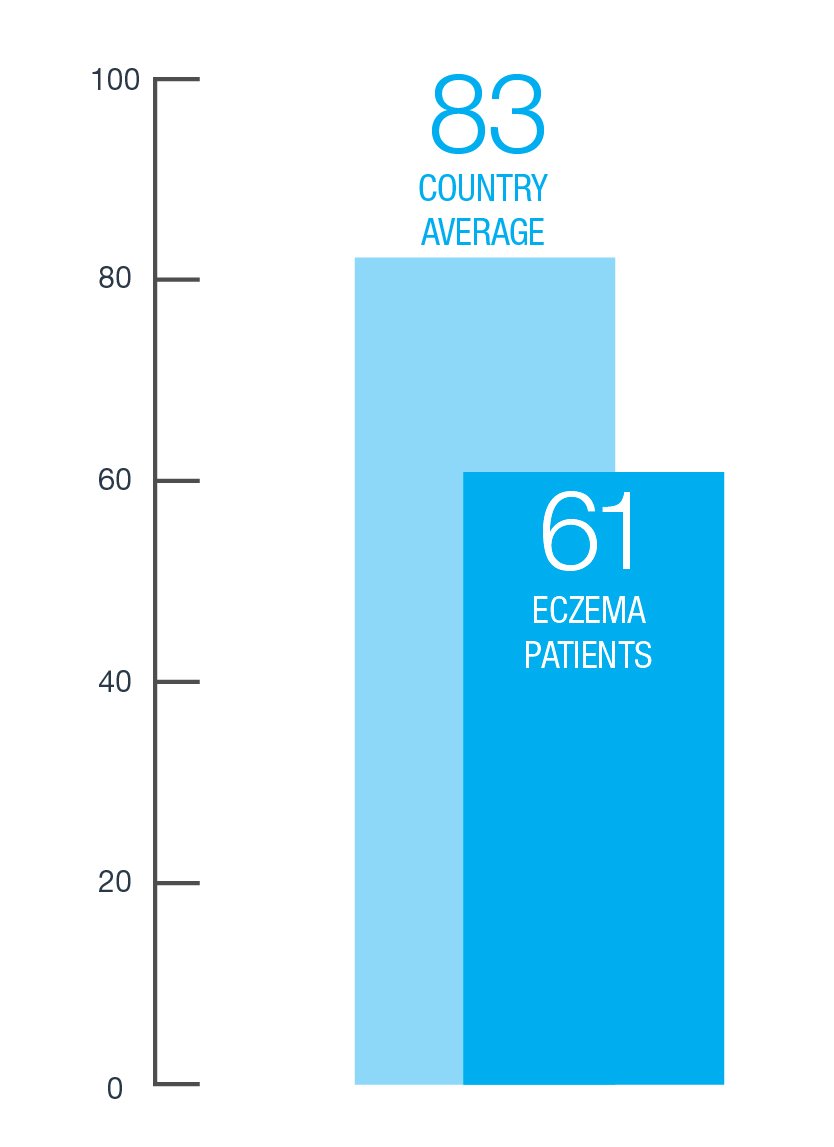
United Kingdom
Dashboard Indicators
-

Long-term Control of Eczema Symptoms
Scores are based on responses to the AD Control Tool: https://www.adcontroltool.com/adct-how-to-use/adct-in-clinical-practice
Data source: GPIIEC global survey of 3,253 patients and caregivers, 2022.
-

Satisfaction with Eczema Treatments
Self reported satisfaction with current treatments (caregivers and adults).
Data source: GPIIEC global survey of 3,253 patients and caregivers, 2022.
-

Life Span Trade-Off (Health Utility)
Percent of remaining life span adult patients would trade off in order to be restored to perfect health. (Derived from EQ5D Utility Scores)
Data source: GPIIEC global survey of 3,253 patients and caregivers, 2022.
-

Eczema Patients Self Reported Health to Compared to Country Average
Self-rated quality of life score for the average person compared to the self-rated quality of life score for adults with eczema.
Data source: GPIIEC global survey of 3,253 patients and caregivers, 2022.
-

Dimensions of Health – Relative Impact (Adults)
Data source: GPIIEC global survey of 3,253 patients and caregivers, 2022.
-

Financial Burden – Impacts
Percent of respondents (adults and caregivers) who reported using savings, borrowing money and/or reducing spending due to eczema. Higher = More Financial Impact
Data source: GPIIEC global survey of 3,253 patients and caregivers, 2022.
-

Shared Decision Making
The percentage of respondents who indicated that the healthcare provider whom they see for eczema asked about their priorities for their eczema care at the most recent visit.
Data source: GPIIEC global survey of 3,253 patients and caregivers, 2022.
-

Eczema Education and Training
Respondents who said a health care provider had ever suggested they attend an eczema training program that happens after the office visit.
Data source: GPIIEC global survey of 3,253 patients and caregivers, 2022.
-

Access to Dermatologists
The United Kingdom ranks last among the 10 countries in this measure of access to dermatologists.
Source: “Focus on Physicians: 2018-19 Census (UK Consultants and Higher Specialty Trainees) .” RCP Census of Consultant Physicians and Higher Specialty Trainees in the UK , Royal College of Physicians , 3 Oct. 2019, www.rcplondon.ac.uk/projects/census-consultant-physicians-and-higher-specialty-trainees-uk.
-

Evidence-Based Guidelines
The NICE guideline met most of the guideline dimension criteria. However, Tthe guideline focused on the pediatric population under 12 years of age. Additionally, the guideline has not been currently endorsed by other medical societies.
Scoring criteria for the guideline measure >
Source: “Overview: Atopic Eczema in under 12s: Diagnosis and Management: Guidance.” National Institute for Health and Care Excellence , 12 Dec. 2007, www.nice.org.uk/guidance/cg57.
Literature Review Key Findings
Patients with AD and their caregivers in the UK experience significant burden due to disease symptoms and psychosocial consequences of AD. Several studies have characterized the quality of life and psychosocial burdens, but relatively few studies assessed interventions to mitigate them. Different subsets of the increasingly diverse population in the UK have unique needs regarding AD, and future studies should better characterize these differences to reduce inequalities in diagnosis and treatment based on race and socioeconomic. Finally, few studies in the UK have mapped the comorbidities associated with AD; this topic is better studied in the US, Germany, and Denmark.
A misalignment in the conceptualization of AD and treatment goals may influence patient and caregiver dissatisfaction with care and suboptimal treatment. Providers tend to focus on visible disease manifestations, but many patients care just as much about improving quality of life, reducing itching and scratching, improving sleep, and alleviating mental health symptoms. Survey studies conducted in the UK noted that some patients and caregivers felt these concerns were not evaluated as thoroughly as those pertaining to physical disease symptoms. Furthermore, providers focus on managing the symptoms of AD while caregivers search for a treatable cause.
Both parents and caregivers experience confusion regarding appropriate and effective treatment regimens, adding to the caregiver burden and reducing adherence to the evidence-based recommendations. Educational interventions succeeded at increasing adherence to treatment regimens and improving outcomes. Although the personal financial burden is not as dramatic in the UK as in other countries, the cost of AD treatment still can be significant, and costly alternative therapies for AD may add to this measure of burden.
Several additional interventions have had modest success in the UK by devoting sufficient time to patient education and clear communication, often with nurse-led programs. These preliminary findings suggest that the key to improving patient satisfaction may be thorough strategies like education with continuous reinforcement of ideas. The ongoing development of additional treatment options for severe disease and more efficacious treatments may significantly reduce the burden, address unmet needs, and increase satisfaction with treatment options and healthcare delivery in the UK.
Learn more about the findings gathered from the United Kingdom literature review.
